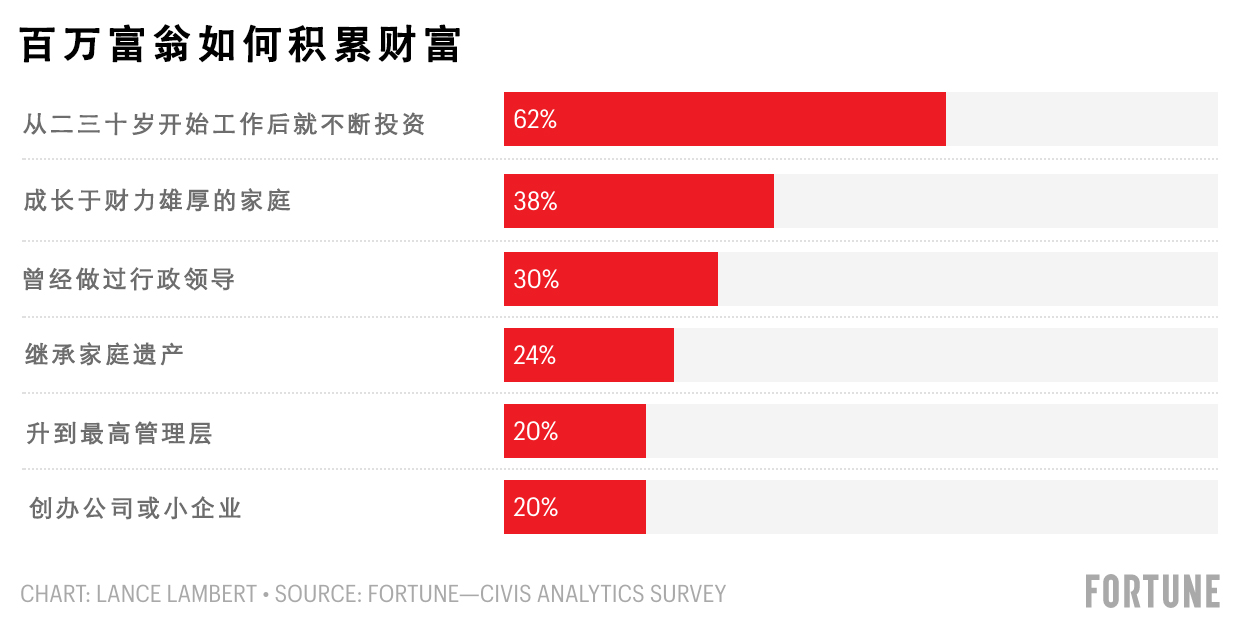目前已经有超过1200万美国民众的净资产超过7位数。当然,随着时间的推移,“百万富翁俱乐部”早已不那么排外和精英化——这要归因于通货膨胀!但是,百万富翁的身份仍然是人们孜孜以求的财务自由、事业成功和经济保障的代名词。
在新冠疫情期间,我们看到居家隔离的千禧一代和Z世代年轻人为了追求百万富翁的标签,争先恐后地打开罗宾汉(Robinhood)之类的交易应用程序。这其中,只有极少数人可以迅速取得成功,其余的人只能够站在一边,静静地观察百万富翁们如何聚沙成塔,飞黄腾达。
为了帮助指导年轻投资者,我们查阅了《财富》杂志和Civis Analytics在2019年12月进行的一项百万富翁调查的结果。此项调查共涉及519名拥有7位数或更高资产的个人。
我们发现,要达到7位数的巨额资产,天才创业公司的创始人和职业运动员都只是个例,而不是常态。而常态如何?答案是,只有稳扎稳打才可以赢得这场竞赛:绝大多数的百万富翁表示,他们从二三十岁开始就不断地投资市场,积累财富。我们调查的百万富翁中有62%符合这一描述。这也意味着,如果罗宾汉和“华尔街赌徒”现象让更多二三十岁的年轻人建立起终身投资习惯,将对帮助美国民众实现财务自由大有助益。

持续投资也意味着不撤出市场,在经济低迷时期尤为如此。这一教训在疫情期间得到了重申。危机开始时,标准普尔500指数(S&P 500)从2020年2月中旬的3380点跌至2020年3月底的2237点。但截至2021年3月3日收盘,标准普尔500指数报3819点。在经济低迷时期继续持有甚至购入股票的投资者们,将实现财富增值。
百万富翁的另一个共同特征是什么?生在富贵家庭。在百万富翁中,38%的人成长于财力雄厚的家庭。当然,现在说这个为时已晚。此外还有一大特征:公司晋升。24%的百万富翁说他们曾经做过行政领导,20%的人升到了最高管理层。
但也不要忽视那些“家庭生意人”:在百万富翁中,20%的人通过自己创办的公司或小企业积累财富。(财富中文网)
*百万富翁调查方法:《财富》杂志和Civis Analytics的合作调查于2019年12月展开,共收到8809份回复。在这些受访者中,519人的家庭净资产超过100万美元。我们将原始数据集加权后,使之具有全国代表性。我们附加了受访者各自人口普查区的家庭收入中位数数据,以评估其净资产是否与地区总体收入有关。比较统计数据发现,这些自称为百万富翁的人往往生活在高收入地区。
编译:杨二一
目前已经有超过1200万美国民众的净资产超过7位数。当然,随着时间的推移,“百万富翁俱乐部”早已不那么排外和精英化——这要归因于通货膨胀!但是,百万富翁的身份仍然是人们孜孜以求的财务自由、事业成功和经济保障的代名词。
在新冠疫情期间,我们看到居家隔离的千禧一代和Z世代年轻人为了追求百万富翁的标签,争先恐后地打开罗宾汉(Robinhood)之类的交易应用程序。这其中,只有极少数人可以迅速取得成功,其余的人只能够站在一边,静静地观察百万富翁们如何聚沙成塔,飞黄腾达。
为了帮助指导年轻投资者,我们查阅了《财富》杂志和Civis Analytics在2019年12月进行的一项百万富翁调查的结果。此项调查共涉及519名拥有7位数或更高资产的个人。
我们发现,要达到7位数的巨额资产,天才创业公司的创始人和职业运动员都只是个例,而不是常态。而常态如何?答案是,只有稳扎稳打才可以赢得这场竞赛:绝大多数的百万富翁表示,他们从二三十岁开始就不断地投资市场,积累财富。我们调查的百万富翁中有62%符合这一描述。这也意味着,如果罗宾汉和“华尔街赌徒”现象让更多二三十岁的年轻人建立起终身投资习惯,将对帮助美国民众实现财务自由大有助益。
持续投资也意味着不撤出市场,在经济低迷时期尤为如此。这一教训在疫情期间得到了重申。危机开始时,标准普尔500指数(S&P 500)从2020年2月中旬的3380点跌至2020年3月底的2237点。但截至2021年3月3日收盘,标准普尔500指数报3819点。在经济低迷时期继续持有甚至购入股票的投资者们,将实现财富增值。
百万富翁的另一个共同特征是什么?生在富贵家庭。在百万富翁中,38%的人成长于财力雄厚的家庭。当然,现在说这个为时已晚。此外还有一大特征:公司晋升。24%的百万富翁说他们曾经做过行政领导,20%的人升到了最高管理层。
但也不要忽视那些“家庭生意人”:在百万富翁中,20%的人通过自己创办的公司或小企业积累财富。(财富中文网)
*百万富翁调查方法:《财富》杂志和Civis Analytics的合作调查于2019年12月展开,共收到8809份回复。在这些受访者中,519人的家庭净资产超过100万美元。我们将原始数据集加权后,使之具有全国代表性。我们附加了受访者各自人口普查区的家庭收入中位数数据,以评估其净资产是否与地区总体收入有关。比较统计数据发现,这些自称为百万富翁的人往往生活在高收入地区。
编译:杨二一
There are more than 12 million Americans who have seven-figure or greater net worth. Sure, over time that millionaires club has become less exclusive and elite. Blame inflation! But millionaire status is still an aspirational marker of wealth, success, and perhaps most importantly, economic security.
During the pandemic we've seen cooped-up millennials and Gen Zers rush into trading apps like Robinhood in pursuit of riches, and yes, in pursuit of that millionaire label. Only a tiny minority will hit it big quickly. The rest would be wise to observe how other millionaires accumulated their wealth.
To help guide young investors, we looked over the results of a millionaire survey that Fortune and Civis Analytics conducted in December 2019. In all, we survey 519 individuals with seven-figure or greater assets.
The finding? When it comes to reaching seven-figure heaven, genius startup founders and pro athletes are the exception, not the rule. It's slow and steady that typically wins the race: The vast majority of millionaires say they struck gold by consistently investing in the markets starting in their twenties and thirties. In total, 62% of millionaires we surveyed fit that description. That means if the Robinhood and r/wallstreetbets phenomenon results in more twenty- and thirtysomethings building lifelong investing habits, it'll go a long way toward helping Americans achieve financial freedom.
Investing consistently also means not pulling out of the market—especially during rough periods. That lesson was retaught during the pandemic. At the onset of the crisis, the S&P 500 fell from 3380 points in mid-February 2020 to 2237 points in late March. But as of the close on March 3, the S&P 500 was at 3819 points. Investors who held—or bought during the dip—saw their wealth soar.
The next most common trait among millionaires? Being born into wealth. Among millionaires, 38% grew up in a household with high financial means. It's too late to change that. Climbing the corporate ladder is next, with 24% of millionaires saying they were an executive at one point in their career. And 20% reached the C-suite.
But don't overlook mom-and-pops: Among millionaires, 20% built wealth through a startup or small business they founded.
*Millionaires survey methodology: The Fortune–Civis Analytics survey fielded in December 2019 and received 8,809 responses. Among those responses, 519 had a household net worth above $1 million. The original data set was weighted to be nationally representative. We appended Census tract median household income data to evaluate if self-reported net worth correlated to high-income areas. Our comparison finds that statistically these self-reported millionaires tend to live in areas where high earners live.






